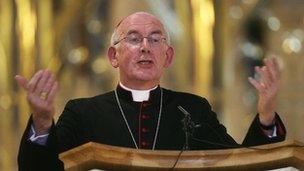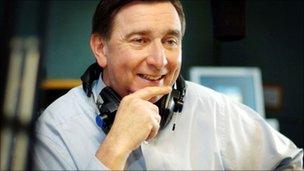Cardinal Sean Brady 'was willing to resign' says D'Arcy
- Published

Cardinal Brady was a priest in County Cavan at the time of the investigation
Irish priest Father Brian D'Arcy has said he believes Cardinal Sean Brady was willing to offer his resignation two years ago but the Vatican refused.
Fr D'Arcy was responding to a BBC This World programme which found that the cardinal failed to pass details of sex abuse to police or parents.
It said that in 1975, Cardinal Brady had the names and address of children being abused by Fr Brendan Smyth.
Smyth, a paedophile, continued to attack children for a further 13 years.
Cardinal Brady claimed the BBC exaggerated his authority at that time. He said he had "absolutely no authority over Smyth" and had felt betrayed that those in the Church who had the power to stop Smyth did not do so.
In an interview with Irish radio station Newstalk on Thursday, Father D'Arcy said he would find it hard to continue if he was in the position of the current Irish Church leader.
But he added that changing the cardinal would not necessarily mean a fresh start.
"The bottom line is that if Cardinal Brady goes, the ordinary people of Ireland won't have a single vote on who replaces him. That is the problem," he said.
"Actually he would have to offer his resignation and if the Vatican didn't take it he would be back to square one.
"Some people think that is what happened two years ago. But the Vatican was saying no."

Fr D'Arcy said he believed the cardinal had been willing to resign
Father Eamon Murray, who is originally from Northern Ireland but now based in England, said many priests feel demoralised by clerical child abuse.
He said Cardinal Brady would have do do a "lot of soul searching".
"If I was in that position, I would have gone a long time ago because it's your own moral credibility that has suffered," he told the BBC's Nolan Show.
"I've listened to a lot of people and naturally people are angry at the church and rightly so and I feel that anger and I feel that hurt and pain.
"It pains me to see people who have practised their faith for a long, long time, many years leaving the church as a result of losing credibility in hierarchy."
Meanwhile, one of Smyth's victims has called for the cardinal's resignation.
Brendan Boland said he thought Cardinal Brady's refusal to resign was wrong.
"I can't understand why he can't see his failings," he said.
"For him to stand without resigning I think that is further abuse of me.
"Resign. Own up to your failings."
In 1975, Cardinal Brady was a priest and teacher in County Cavan in the Republic of Ireland, when he was sent by his bishop to investigate a claim of child sexual abuse by a fellow priest.
That priest was later exposed as Smyth, who died in prison in 1997, one month into a 12-year prison sentence.
The first child to tell his parents about the abuse was the then 14-year-old Brendan Boland.
Speaking on Wednesday, Cardinal Brady said in a <link> <caption>statement</caption> <url href="http://www.bbc.co.uk/news/uk-northern-ireland-17926449" platform="highweb"/> </link> : "With others, I feel betrayed that those who had the authority in the Church to stop Brendan Smyth failed to act on the evidence I gave them.
"However, I also accept that I was part of an unhelpful culture of deference and silence in society, and the Church, which thankfully is now a thing of the past."
The cardinal said he was "shocked, appalled and outraged" by Smyth and said he had trusted that those with the authority to act in relation to Smyth would treat the evidence seriously and respond appropriately.
"The commentary in the programme and much of the coverage of my role in this inquiry gives the impression that I was the only person who knew of the allegations against Brendan Smyth at that time and that because of the office I hold in the Church today I somehow had the power to stop Brendan Smyth in 1975.
"I had absolutely no authority over Brendan Smyth. Even my Bishop had limited authority over him. The only people who had authority within the Church to stop Brendan Smyth from having contact with children were his Abbot in the Monastery in Kilnacrott and his Religious Superiors in the Norbertine Order."
Police are also studying the documentary. A spokesman for the Police Service of Northern Ireland said: "The PSNI will study the content of this programme. We can make no further comment at this time."
- Published2 May 2012
- Published3 May 2012
- Published2 May 2012
- Published2 May 2012
- Published2 May 2012
- Published2 May 2012
- Published1 May 2012
- Published25 March 2012